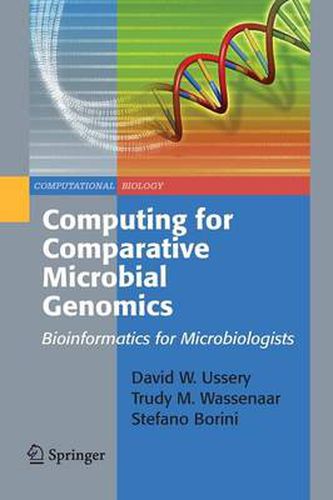Readings Newsletter
Become a Readings Member to make your shopping experience even easier.
Sign in or sign up for free!
You’re not far away from qualifying for FREE standard shipping within Australia
You’ve qualified for FREE standard shipping within Australia
The cart is loading…






This title is printed to order. This book may have been self-published. If so, we cannot guarantee the quality of the content. In the main most books will have gone through the editing process however some may not. We therefore suggest that you be aware of this before ordering this book. If in doubt check either the author or publisher’s details as we are unable to accept any returns unless they are faulty. Please contact us if you have any questions.
The major difficulty many microbiologists face is simply that of too much information. As a result of sequencing technologies becoming so economical, there is a very real and pressing need for high-throughput computational methods to compare hundreds and thousands of bacterial genomes. This accessible text/reference provides a coherent set of tools and a methodological framework for comparing raw DNA sequences and fully annotated genome sequences, then using these to build up and test models about groups of interacting organisms within an environment or ecological niche. Easy-to-follow, this introductory textbook is built around teaching computational / bioinformatics methods for comparison of microbial genomes, and includes detailed examples of how to compare them at the level of DNA, RNA, and protein, in terms of structural and functional analysis.Topics and Features: / Contains five introductory chapters each representing a specific scientific field, to bring all readers up to the same basic level / Familiarizes readers with genome sequences, RNA sequences (transcriptomics), proteomics and regulation of gene expression / Describes basic methods to compare genomes and visualize the results for easy interpretation / Discusses microbial communities, providing a framework for analysing and comparing individual genomes or raw DNA derived from complete ecosystems / Introduces various atlases, building up to the Genome Atlas / Offers numerous helpful examples throughout / Focuses on the use and interpretation of publicly available Web tools / Provides supplemental resources, such as Web links, at http://comparativemicrobial. com Developed from a set of lectures for a course in Comparative Microbial Genomics taught since 2001, this wide-ranging foundational textbook is aimed at advanced undergraduate and graduate students in Bioinformatics and Microbiology. The authors are from diverse backgrounds complementing the interdisciplinary nature of the topic and consequently have developed a common scientific language.Readers will find this text an invaluable reference for computational and bioinformatics tools.
$9.00 standard shipping within Australia
FREE standard shipping within Australia for orders over $100.00
Express & International shipping calculated at checkout
This title is printed to order. This book may have been self-published. If so, we cannot guarantee the quality of the content. In the main most books will have gone through the editing process however some may not. We therefore suggest that you be aware of this before ordering this book. If in doubt check either the author or publisher’s details as we are unable to accept any returns unless they are faulty. Please contact us if you have any questions.
The major difficulty many microbiologists face is simply that of too much information. As a result of sequencing technologies becoming so economical, there is a very real and pressing need for high-throughput computational methods to compare hundreds and thousands of bacterial genomes. This accessible text/reference provides a coherent set of tools and a methodological framework for comparing raw DNA sequences and fully annotated genome sequences, then using these to build up and test models about groups of interacting organisms within an environment or ecological niche. Easy-to-follow, this introductory textbook is built around teaching computational / bioinformatics methods for comparison of microbial genomes, and includes detailed examples of how to compare them at the level of DNA, RNA, and protein, in terms of structural and functional analysis.Topics and Features: / Contains five introductory chapters each representing a specific scientific field, to bring all readers up to the same basic level / Familiarizes readers with genome sequences, RNA sequences (transcriptomics), proteomics and regulation of gene expression / Describes basic methods to compare genomes and visualize the results for easy interpretation / Discusses microbial communities, providing a framework for analysing and comparing individual genomes or raw DNA derived from complete ecosystems / Introduces various atlases, building up to the Genome Atlas / Offers numerous helpful examples throughout / Focuses on the use and interpretation of publicly available Web tools / Provides supplemental resources, such as Web links, at http://comparativemicrobial. com Developed from a set of lectures for a course in Comparative Microbial Genomics taught since 2001, this wide-ranging foundational textbook is aimed at advanced undergraduate and graduate students in Bioinformatics and Microbiology. The authors are from diverse backgrounds complementing the interdisciplinary nature of the topic and consequently have developed a common scientific language.Readers will find this text an invaluable reference for computational and bioinformatics tools.